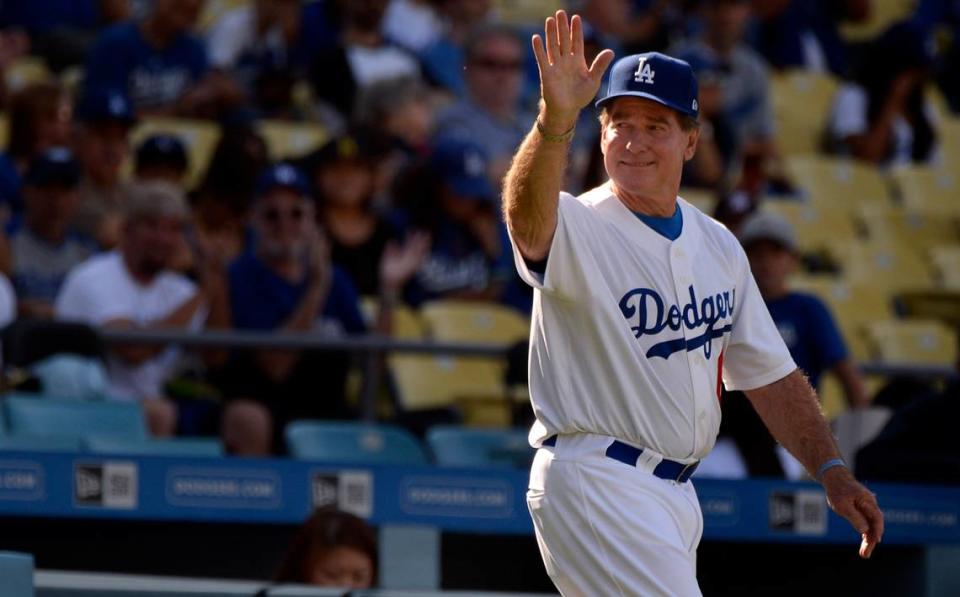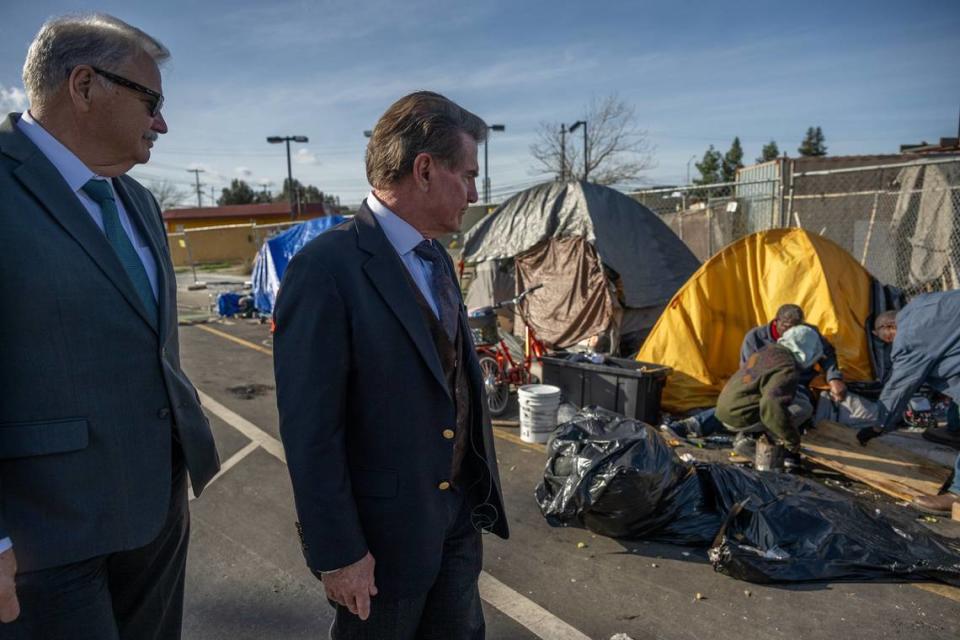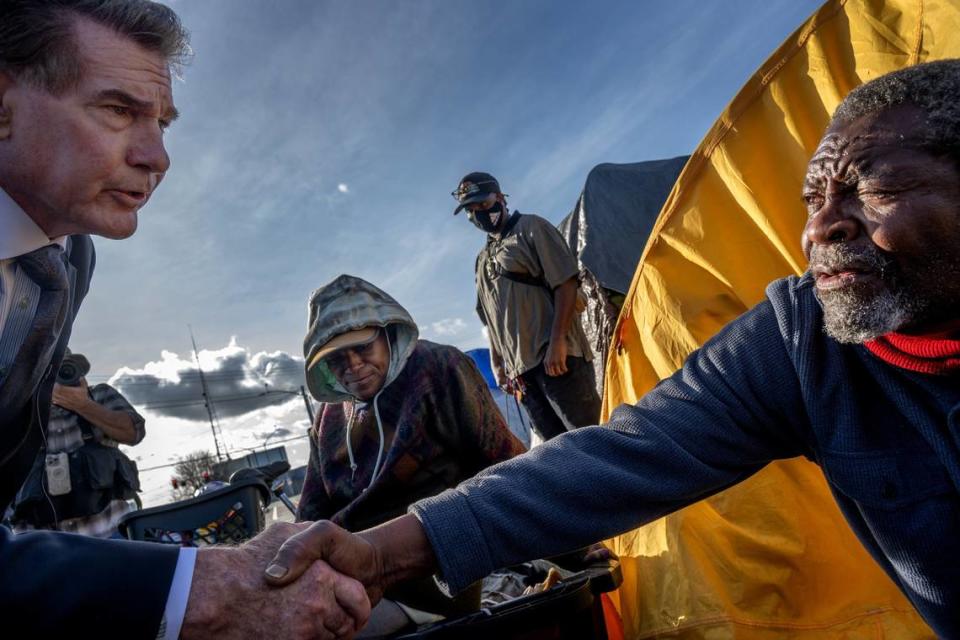Who is Steve Garvey, retired baseball star running as a California Republican for Senate?
California will gets its first lengthy, unfiltered look at Republican Senate candidate Steve Garvey at Monday night’s Senate debate.
So far, he’s given few hints on what to expect.
The former Los Angeles Dodgers and San Diego Padres star offered reporters a glimpse in Sacramento last week. He said he hoped to express how he feels about California and how he can best represent constituents, but offered few details.
Garvey, who has climbed to second place in some polls, is vying with Reps. Adam Schiff, D-Burbank, Katie Porter, D-Irvine, Barbara Lee, D-Oakland, and others to succeed the late Sen. Dianne Feinstein.
The three House Democrats and Garvey will debate in Los Angeles at the University of Southern California campus from 6-7:30 p.m. Pacific Time. Viewers can stream the debate on Politico or on various channels provided by Fox 11 Los Angeles, whose reporters are moderating it.
The debate promises to be the first time since he launched his campaign that Garvey clarifies his stance on key issues such as abortion or who he’d support for president in 2024 — issues that have affected election outcomes in recent years.
Asked about his coyness on major issues, Garvey told The Sacramento Bee on Wednesday that he believes voters “want to hear more about how I can improve their quality of life, or the Second Amendment — compassionate issues.”
Regardless of where he stands, Garvey “has something that’s gold politics: name ID,” said Ken Khachigian, who worked for the campaigns and in the White House for former Republican Presidents Ronald Reagan and Richard Nixon.
“In terms of the party, it makes a lot of sense to have somebody like Steve Garvey running instead of conceding the U.S. Senate race to the left-wing Democrats,” said Khachigian, the famed GOP consultant and speechwriter.
No Republican has won statewide in California since 2006. The top two finishers in the March 5 primary will advance to the general election. Any surviving Democrat will be a strong favorite to win the seat held by Sen. Dianne Feinstein, who died in September.
Garvey was in Sacramento last week for a tour of a local homeless encampment. He has done similar tours of cities struggling with housing in other parts of the state.
The former first baseman crouched to speak at eye level with a man on a curb who told Garvey he lacked medical insurance.
Near the end of their conversation, Garvey asked the man, Lavell Wright: “You like baseball?”
“No,” Wright replied.
“I don’t either anymore,” Garvey said jokingly. “Well,” he continued, “my name is Steve Garvey and I’m running for the U.S. Senate, and I’ve been to —”
“Not the Steve Garvey” interrupted Eric Wright, who was sitting nearby, “that’s a baseball player.”
“That’s me,” Garvey said.
“I thought I recognized your face,” Eric Wright said.

LA Dodgers’ famed first baseman
Fans of the 1970s Los Angeles Dodgers would recall the enduring and dynamic infield of first baseman Garvey, second baseman Davey Lopes, third baseman Ron Cey and shortstop Bill Russell, who played together for almost nine seasons. The crew helped the Dodgers win four National League pennants and the 1981 World Series.
Garvey, who played in Major League Baseball for the Dodgers and Padres from 1969 to 1987, was acclaimed for his defensive skills. He was also Sports Illustrated’s “Iron Man” in baseball, his campaign website points out. A 10-time All-Star, Garvey was the National League’s Most Valuable Player in 1974 and the league’s Championship Series MVP in 1978 and 1984.
He’s held several positions since, forming his own marketing group, serving on several committees and boards, and even branching into television production. He’s helped with charities concerning the Special Olympics, Ronald McDonald House, United Way and others. And he’s traveled as a motivational speaker on subjects not limited to teamwork and leadership.
Becoming a U.S. senator four decades after dropping the baseball mitt that Garvey thinks may be his “ultimate legacy in life.”
“To be able to have done that, to affect people’s lives, and then all of sudden at 75 to run, arguably, for the most difficult seat in America as a moderate, is a daunting challenge,” Garvey said during his Sacramento stop. “But I’m going to win. I’m going to be your U.S. senator, duly elected, next year at this time. And I’m going to make a difference.”
In early 2023, Garvey said, “two different individuals” with “two different ideologies” asked him if he would consider running for Senate. Garvey said he woke up one March day last year, turned the television on and saw dysfunction in Washington, D.C., and that sealed the deal: “It was the incivility of our elected officials, how they treat each other. It was the business of politics, and not policy.”

Democrats have a numbers advantage
California’s overwhelming Democratic voter registration makes it difficult for any Republican in a statewide race.
There are two separate contests for the Senate this year: A special election to finish Feinstein’s current term, which ends in January 2025, and another race for a full six-year term to start right after that.
Whoever wins the special election then will be sworn into the Senate as soon as possible.
In the meantime, Gov. Gavin Newsom appointee Sen. Laphonza Butler, D-Calif., is serving the remainder of Feinstein’s term. Butler, 44, is not running in either race.
Support for Garvey has surged since he joined the race in October. He is in a close third in races to succeed Feinstein, according to a recent Berkeley Institute of Governmental Studies poll.
In the survey released Jan. 12, Schiff led with 21% of likely voters in the race for the full term. Porter gathered 17% while Garvey had 13%. Lee got 9%. Other respondents picked different candidates or were undecided.
There are fewer candidates in the special election, including the three House Democrats and Garvey. The Berkeley poll indicated a tighter race for the top two there that could filter into the race for the full term if Republicans coalesce around Garvey. Schiff had 21%, Porter had 18%, Garvey had 17%, Lee had 12% and Republican Eric Early had 11%.
The Berkeley poll surveyed 8,199 California registered voters, including a weighted sample of 4,470 likely voters. It was conducted online from Jan. 4 to 8 in English and Spanish. Pollsters estimated a sampling error of about plus-or-minus 2 percentage points for likely voters.
In an Emerson College Polling/Inside California Politics January survey, Garvey was second to Schiff in the primary. Still, just as many of those who supported either Schiff or Garvey were undecided. The poll of 1,087 registered voters was conducted Jan. 11-14 with a plus-or-minus 2.9% margin of error.

Holding Democrats to account
Khachigian, who does not know Garvey personally, said no matter the outcome, having the baseball star run to keep a thumb on the Democratic Party was a good strategy.
Forcing Democrats to have to focus on raising money in California could pull some attention and money away from battleground Senate states in the November election. He said the National Republican Senatorial Committee, which campaigns for GOP candidates, should help Garvey in the primary.
The NRSC has not spent much on California Senate recently. It is not expected to this year.
What Garvey will need to be prepared for, said both Khachigian and Kyle Kondik, the managing editor of the election analyses organization Sabato’s Crystal Ball at the University of Virginia Center for Politics, is for Porter to come on the offensive. Both Porter and Schiff are strong fundraisers and have significant amounts of campaign cash to spend on advertisements.
”For Porter, it’s kind of do or die time,” Kondik said, “because there is a real threat that she doesn’t make the top two.”
The Bee reached out to Porter’s campaign to see if they would employ this strategy.
A November race between Schiff, who is leading in polls, and Garvey would likely hand the Democrat an easy win, Kondik said: “Obviously if it’s Schiff and Porter, then it’s much more competitive and more interesting in November.”
If Garvey won in November, he would be the state’s first Republican senator since 1992, when Gov. Pete Wilson appointee John Seymour lost to Feinstein. Wilson had appointed Seymour to take over the Senate spot when he became governor.
Kondik said it makes sense for Garvey to be reluctant to speak out on controversial issues.
“Whenever you’re running for the party that’s on the wrong side of the stage, you’re going to try to create distance between yourself and the national party and the national party positions,” Kondik said.
‘If my dad was alive, I would tell him that I met you’
Concern rose recently over the age of members of Congress: Senators’ average age last year was 65. Garvey, 75, recently quipped he was young for the role. He said he will only serve one term.
Schiff is 63; Porter, 50; Lee, 77.
On homelessness, which was the center of the recent Sacramento stop, Garvey was asked what the federal and state government could do better. He did not provide specifics, saying rather the he would “find that out.”
“In a federal position like U.S. Senate you can get those answers,” Garvey told reporters. “On that stage, on that platform, I’ll get answers.”
Congress has not been able to allocate significant money to remedy homelessness this year; lawmakers again extended a deadline to set funding levels for the government this year.
After he was recognized by Eric Wright, one of the men at the Sacramento encampment who is the son of a baseball fan, Garvey continued to pitch himself to the small group of unhoused individuals and onlooking reporters.
“Let me say this,” Garvey said, “I’m running for the U.S. Senate. I’ve been in the streets of San Diego and Los Angeles, and now here with you. And I pledge that when I get to Washington, I will be a loud voice for you.”
Garvey promised he would look into if federal funds were wasted rather than used to improve the circumstances of the unhoused people and that they would have better opportunities if he was elected.
“And I guarantee you that any money spent to make your life better, will be put to good use — to your benefit,” Garvey said. He shook their hands before leaving.
“If my dad was alive,” said Eric Wright, “I would tell him that I met you. And he would be very excited.”



